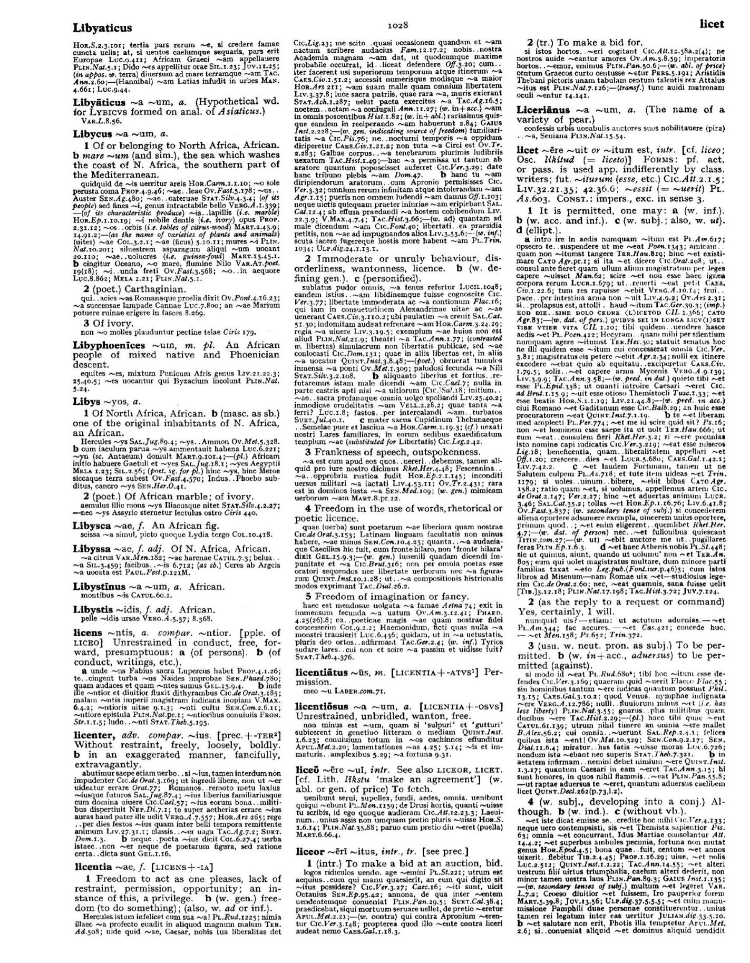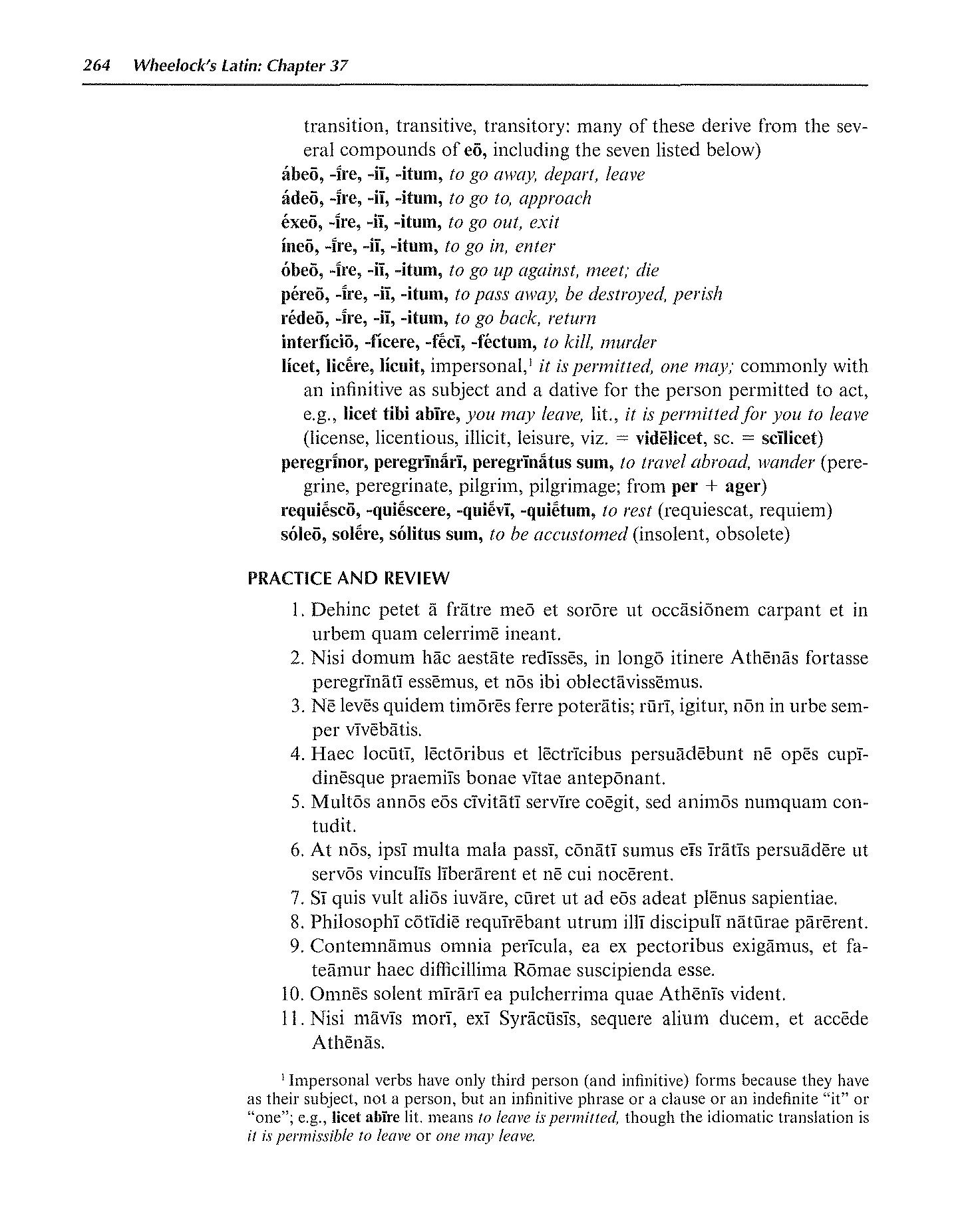
page_listing.tpl
page_subListingDetails.tpl
sub_listingDetails_style1.tpl
sub_listingDetails.title.tpl
licēre it is permitted
licēre is a Latin Verb that primarily means it is permitted.
Definitions for licēre
Wheelock's Latin
Verb
- 1
impersonal, it is permitted, one may; commonly with an infinitive as subject and dative for the person permitted to act., e.g. licet tibi abīre, you may leave, lit., it is permitted for you to leave
English derivatives:
license licentious illicit leisure
Oxford Latin Dictionary
Verb
- 1
It is permitted, one may: (a) (w. inf.). (b) (w. acc. and inf.). (c) (w. subj.; also. w. ut). (d) (ellipt.).
- 2
(as the reply to a request or command) Yes, certainly, I will.
- 3
(usu. w. neut. pron. as subj.) To be permitted. (b) (w. in.+acc., aduersus) to be permitted (against).
- 4
(w. subj., developing into a conj.) Although. (b) (w. ind.). (c) (without vb.).
Sentences with licēre
Latin to English
Ut saepe fassī sumus, tibi nōn licet Rōmā Athēnās īre.Compare As we have often admitted, you may not (are not permitted to) go from Rome to Athens (lit., to go is not permitted to you).
Et urnam licet frāctam sculpās.Compare And you may carve a broken arm.
Vōbīs licet hīc cēnāre.Compare You are allowed to dine here.
Omne bellum sumi facile, ceterum aegerrume desinere ... incipere cuivis, etiam ignavo licere, deponi, cum victores velint.Compare War is always easy to start, but very hard to end ... anyone, even a coward, may take up arms, but only the victors can say when they are to be laid down.
Conjugation table for licēre
Cactus2000
| ACTIVE | |
| Indicative present | Indicative imperfect |
| liceō licēs licet licēmus licētis licent | licēbam licēbās licēbat licēbāmus licēbātis licēbant |
| Indicative perfect | Indicative pluperfect |
| licuī licuistī licuit licuimus licuistis licuērunt / licuēre | licueram licuerās licuerat licuerāmus licuerātis licuerant |
| Indicative future | Indicative future perfect |
| licēbō licēbis licēbit licēbimus licēbitis licēbunt | licuerō licueris licuerit licuerimus licueritis licuerint |
| Subjunctive present | Subjunctive imperfect |
| liceam liceās liceat liceāmus liceātis liceant | licērem licērēs licēret licērēmus licērētis licērent |
| Subjunctive perfect | Subjunctive pluperfect |
| licuerim licueris licuerit licuerimus licueritis licuerint | licuissem licuissēs licuisset licuissēmus licuissētis licuissent |
Infinitive present licēre Infinitive perfect licuisse Infinitive future - | Imperative present licē licēte Imperative future licētō licētō licētōte licentō |
| PARTICIPLE | ||
| Participle present active | ||
| licēns | licentēs | |
| licēns | licentēs | |
| licēns | licentēs | |
| licēns | licentēs | |
| licēns | licentēs | |
| Participle future active | ||
| - | - | |
| - | - | |
| - | - | |
| - | - | |
| - | - | |
| Participle perfect passive | ||
| - | - | |
| - | - | |
| - | - | |
| - | - | |
| - | - | |
| Gerundive | ||
| licendus | licendī | |
| licendus | licendī | |
| licendus | licendī | |
| licendus | licendī | |
| licendus | licendī | |
| Gerund | Supine | |
| licēre | - | |
| licēre | - | |
| licēre | ||
| licēre | ||
| licēre | ||
| PARTICIPLE | ||
| Participle present active | ||
| Nom. | licēns | licentēs |
| Gen. | licentis | licentium |
| Dat. | licentī | licentibus |
| Acc. | licentem | licentēs |
| Abl. | licente | licentibus |
| Participle future active | ||
| Nom. | - | - |
| Gen. | - | - |
| Dat. | - | - |
| Acc. | - | - |
| Abl. | - | - |
| Participle perfect passive | ||
| Nom. | - | - |
| Gen. | - | - |
| Dat. | - | - |
| Acc. | - | - |
| Abl. | - | - |
| Gerundive | ||
| Nom. | licendus | licendī |
| Gen. | licendī | licendōrum |
| Dat. | licendō | licendīs |
| Acc. | licendum | licendōs |
| Abl. | licendō | licendīs |
| Gerund | Supine | |
| Nom. | licēre | - |
| Gen. | licendī | - |
| Dat. | licendō | |
| Acc. | licendum | |
| Abl. | licendō | |
Data sources
Notes
- Definitions
- Frederick M. Wheelock, Wheelock's Latin, 6th ed., rev. Richard A. LaFleur (New York, NY: HarperCollins Publishers, 2005): 264.
- P. G. W. Glare, Oxford Latin Dictionary, Vols. 1-8 (Oxford: Clarendon Press, 1982): 1028.
- Word frequencies
- Christopher Francese, "Latin Core Vocabulary," Dickinson College Commentaries, last modified 2014, http://dcc.dickinson.edu.
- Paul B. Diederich, The Frequency of Latin Words and Their Endings, PhD diss., (Columbia University, 1939).
- Louis Delatte, Suzanne Govaerts, Joseph Denooz, and Etienne Evrard, Dictionnaire fréquentiel et index inverse de la langue latine [Frequency Dictionary and Inverse Index of the Latin Language] (Liège, Belgium: Laboratoire d'analyse statistique des langues anciennes de l'Université de Liège [L.A.S.L.A.], 1981): 120.
Bibliography
Allen, Joseph H. Allen and Greenough's New Latin Grammar for Schools and Colleges: Founded on Comparative Grammar. Edited by James B. Greenough, George L. Kittredge, Albert A. Howard, and Benjamin L. D'Ooge. Boston, MA: Ginn & Company, 1903.
Crystal, David. A Dictionary of Linguistics and Phonetics. 6th ed. Oxford, UK: Blackwell Publishing, 2008.
Delatte, Louis, Suzanne Govaerts, Joseph Denooz, and Etienne Evrard. Dictionnaire fréquentiel et index inverse de la langue latine [Frequency Dictionary and Inverse Index of the Latin Language]. Liège, Belgium: Laboratoire d'analyse statistique des langues anciennes de l'Université de Liège (L.A.S.L.A.), 1981.
Diederich, Paul B. The Frequency of Latin Words and Their Endings. PhD diss., Columbia University, 1939.
Francese, Christopher. "Latin Core Vocabulary." Dickinson College Commentaries. Last modified 2014. http://dcc.dickinson.edu/latin-vocabulary-list.
Gildersleeve, Basil L., and Gonzales Lodge. Gildersleeve's Latin Grammar: Third Edition, Revised, and Enlarged. 3rd ed. London, England: Macmillan and Co., 1903.
Glare, Peter G.W. Oxford Latin Dictionary. Vols. 1-8. Oxford, England: Clarendon Press, 1982.
Krüger, Bernd. "Latin Conjugation Tables." Cactus2000. Accessed May 5, 2023. https://latin.cactus2000.de/index.en.php.
Pierson, Nick. "Sound of Text." Accessed October 26, 2019. https://soundoftext.com.
Wheelock, Frederick M. Wheelock's Latin. 6th ed. Revised by Richard A. LaFleur. New York, NY: HarperCollins Publishers, 2005.
Wiktionary Contributors. "Victionarium." Wikimedia Foundation, Inc. Updated March 18, 2019. https://la.wiktionary.org/wiki/Victionarium:Pagina_prima.
Citation
Chicago (17th ed.)
Allo Contributors. "licet, licēre, licuit (v.) - Latin Word Definition." Allo Latin Dictionary. Last modified . Accessed February 20, 2026. http://ancientlanguages.org/latin/dictionary/licet-licere-licuit.
Entry created on . Last updated on .







